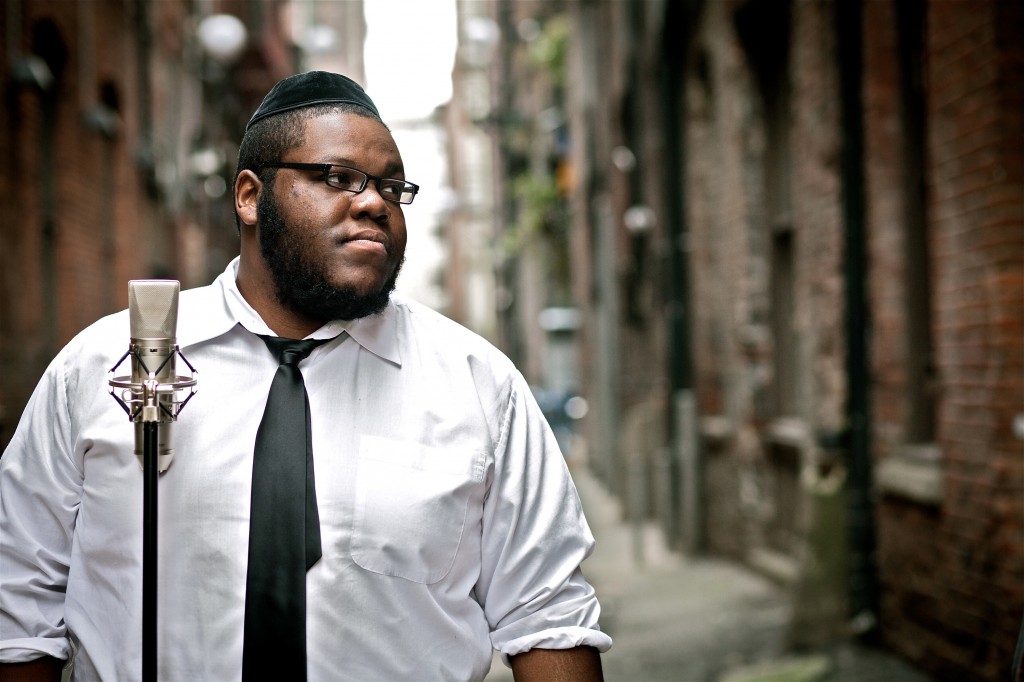
To the Jewish world, the name Damian Black means very little. He was a rapper from outside of Seattle, with his own music label and growing popularity.
Unfortunately, as many can attest, success can make others feel threatened and force a response. Another rapper in the community did just that. He threatened D Black, as he was known in the rap circle. D Black responded. The back-and-forth grew more intense and led to a shooting and an arrest.
D Black and the other rapper found a way to reconcile. Neither was jailed. But those events could shake even the strongest person’s spirits. This wasn’t the first time Black had been into some of life’s deepest darkness.
He grew up in a family environment not conducive towards spiritual growth. He lost his mom when he was just 19. When he was seven, the FBI raided his home. Darkness could be the simplest and most accurate descriptor of Black’s life.
But out of darkness, one can better appreciate the light.
“One time I was in six hours of talking to God and I just stopped. I saw my whole life flash before my eyes. I was in a very serious meditation talking to God and I just started seeing my path to where I am now. I started seeing God putting all the puzzle pieces together,” Black said.
From there, Black turned to religion. His grandfather, a practicing Muslim, taught Damian the practices of Islam. He grew up learning Muslim traditions through the early part of his life.
When he was 13 an evangelical Christian group recruited Damian to go to a summer camp. It was something new, something clean, something inspiring.
He converted to Christianity. But he still had questions. Everything Black had been through in his life he viewed from a Christian perspective, but it didn’t connect.
One simple, yet complicated question kept bothering him: “If Jesus was Jewish, why aren’t Christians Jewish?” The questions didn’t stop there.
He researched. He found. He asked again. He felt a connection with the Old Testament, but couldn’t let go of Jesus. He went to his father—a Christian educator—to ask more questions.
None of the answers gave him any solace. So, in 2010, he turned to Judaism.
Married in 2008, he got his wife—a devout Christian—involved in his pursuit of Judaism. It wasn’t easy. They fought and they struggled until they got on the same page.
Then, they studied together. They pushed each other. They found answers together.
“When she saw me studying eight hours a day, she didn’t know what to think. Then she started to do research on her own and she felt like she had been lied to her whole life,” Nissim said. “When she had come to a point when she realized enough is enough in something, she gave me the [strength’ to keep going.”
They converted to Judaism together. Damian changed his name from Damian Black to Nissim (Hebrew for “Miracles”) Black.
“One of the reasons why I chose the name Nissim is because the transformation is a miracle, coming from the background and lifestyle that I came from,” Nissim said.
But life wasn’t getting much easier. He was out of work, the bills piled up and then the worst happened—his baby son contracted meningitis. With no money and no options, Black needed a miracle.
He tells the story at length in an interview with Tilson. After a few weeks at the hospital, Black went back to his home, put his daughter to bed and prayed to God for five hours straight.
He had a broken microphone that hadn’t worked for years. He challenged God: If you could make the microphone work, I will get back into music after a two-year hiatus.
After he finished praying, he took the microphone, hooked up all his equipment and plugged it in. The microphone worked. It was his miracle. Black’s response was fitting.
He laughed.
“To me in a sense, that wasn’t just the wow moment in itself, it was much more than that. I had people all over the country calling me and texting me and emailing me telling me to get back into music and these people weren’t even spiritual people. It was funny. It was hilarious and then that moment happened I was just like ‘Okay, I hear you.’”
“Nissim is something very beautiful to think about. There must be something in his personality, a really good person with a mind to search and to want to have something much better out of life than whatever he was involved with in his childhood,” said Rabbi Simon Benzaquen who collaborates with Nissim in his music.
He has turned that music into his mission: To make music that inspires and elevates the world.
“I want to make music that makes people feel good, whole and complete. Music is a very powerful thing,” Nissim said. “I want to be able to make music that is going to take people to a healthier set of emotions but also challenge them to think outside of the box.”
At the heart of his music is his Judaism. A journey full of twists, turns, highs and lows, but he sees all of it as part of the essence of what makes him Jewish.
“On the outside looking in, [Judaism] is very, very glorious to a person that is seeking absolute truth. It took me hours and hours of prayer to get myself to the place where I had the answers,” he said. “One thing that I came to know through studying the Bible was that I saw this overwhelming love for the Jewish people over and over again and it was so beautiful. I couldn’t stand seeing that and being on the outside of that. I said, ‘Hashem I want in!’”
The Seattle Jewish community has embraced Nissim and his family. As is tradition with conversion, he and his wife got married again, this time as Jews. According to the JTA, the whole community pitched in to make it something memorable.
“It’s been really amazing. I have been very welcomed. I haven’t felt any opposition,” he said. “I’m the type of person where I am going to be who I am and I think the authenticity of that, people have been able to accept it.”
“I’m not hiding anything and I don’t blend in well. If it is going to look loud, I’ll be loud. I’ve realized that me being me has been able to help more Jews along the path more than me being quiet would ever do.”
Nissim’s vibrant approach to Judaism and to his craft couldn’t be more perfectly timed. In a season of miracles and Hanukkah candles, he has brought his own light. In so doing, he has provided a path, a map, and an inspiration to those struggling with spiritual conflicts.
“We need to not be apologetic. We cannot be afraid of our own shadow. Much like Nissim, we need to be our own light for others to follow,” Rabbi Benzaquen said.
Nissim’s approach to Judaism has brought new attention and a new light on the Jewish world. As the recent Pew Survey on American Jewish life detailed, nearly 22 percent of Jews in America claim to not have a religion and 30 percent reported having no denomination, but he maintains a hope and optimism.
“To just talk to Haxhem, who loves every single creature and every single person, you may end up becoming religious,” he said. “He’s waiting and he’s right there. It’s amazing.”
“I get messages from all over the world. They can’t believe that such a thing exists. I am a Rabbi that does everything I can to create community. An opportunity like this came and I grabbed it and we know how to use it for good,” Rabbi Benzaquen said. “I want to benefit the Jewish people, the people of Israel and the world if need be because messages like [Nissim’s] are needed today more than ever.”
Eric Steitz is a recent graduate of Hastings College in Nebraska.

